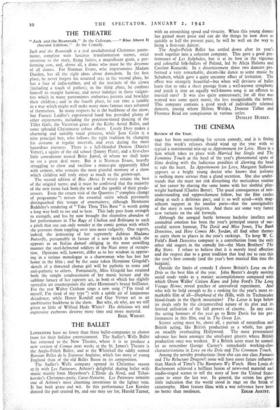THE CINEMA
Review of the Year.
1941 has been outstanding for screen comedy, and it is fitting that this week's releases should wind up the year with so
typical a matrimonial mix-up as Appointment for Love. Here is a film which takes its place with Married but Single and The Feminine Touch at the head of the year's phenomenal spate of films dealing with the ludicrous penalties of allowing the head
tc rule the heart. In Appointment for Love, Margaret Sullavan appears as a bright young doctor who knows that jealousy
is nothing more serious than a gland. secretion. She also under- stands that she must not risk disturbing the meticulous routine of her career by sharing the same home with her slothful play- wright husband (Charles Boyer). The usual consequences of mis- understanding and rapprochement follow, but the film rattles along at such a delirious pace, and is so well acted—with mag- nificent support in the smaller parts—that the unoriginality of the story is soon forgiven. And there are some very funny new variants on the old formula.
Although the unequal battle between bachelor intellect and connubial emotion has been the year's principal source of suc- cessful screen humour, The Devil and Miss Jones, The Bank Detective, and Here Comes Mr. Jordan, all find other themes to carry them to places in the year's rankings. To keep W. C.
Field's Bank Detective company is a contribution from the only other old stagers in the comedy, list—the Marx Brothers' The Big Store. I refuse to believe that it is merely loyal affection and the respect due to a great tradition that lead me to rate this the year's best comedy (and the year's best musical film into the bargain).
Outside the limits of comedy I choose Britain's Love on the Dole as the best film of the year. John Baxter's deeply moving social study ranks as a mature accomplishment compared with which Orson Walles' Citizen Kane and John Ford's The Long Voyage Home, reveal patches of unresolved experiment. And who will be bold enough to fix a ranking for the year's most re-
markable. film of all—Shepherd of the Hills, with its Technicolor blood-feuds in the Ogerk mountains? The Letter is kept below
its rivals only by the circumscribed nature of its plot and its limited utilisation of the full powers of cinema. In any case, the acting honours of the year go to Bette Davis for her per- formances in this film, and in The Great Lie.
Screen acting must be, above all, a pursuit of naturalism and British acting, like British production as a whole, has gone on steadily overhauling Hollywood. The most pronounced advance has been amongst the small-part players where British production once was weakest. If a British actor must be named, let us remember George Carney's remarkable working-class characterisations in Love on the Dole and The Common Touch.
Among the novelty productions (how else can one class Fantasia and The Reluctant Dragon?) none will have more future influence than March of Time's The Ramparts We Watch. Here Louis de Rochemont achieved a brilliant fusion of news-reel material and studio-staged scenes to tell the story of how the United States came to enter the last war. In general, the screen has given little indication that the world stood in 194i on the brink of catastrophe. Most feature films with a war reference have been


























 Previous page
Previous page